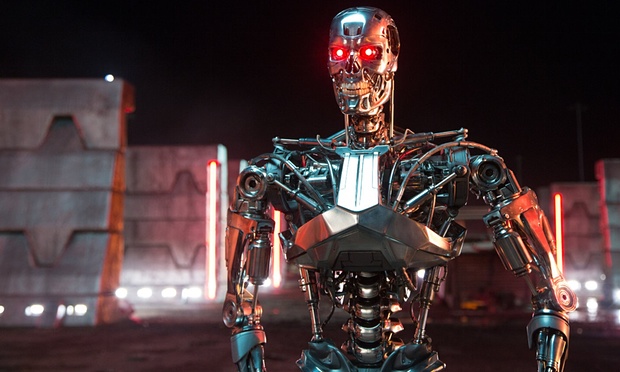Musk, Wozniak and Hawking Urge Ban on Warfare AI and Autonomous Weapons
IN FOCUS, 3 Aug 2015
More than 1,000 experts and leading robotics researchers sign open letter warning of military artificial intelligence arms race.

Over 1,000 leading experts in artificial intelligence have signed an open letter calling for a ban on military AI development and autonomous weapons, as depicted within the Terminator sci-fi franchise. Photograph: Moviestore/REX Shutterstock/Moviestore/REX Shutterstock
27 Jul 2015 – Over 1,000 high-profile artificial intelligence experts and leading researchers have signed an open letter warning of a “military artificial intelligence arms race” and calling for a ban on “offensive autonomous weapons”.
The letter, presented at the International Joint Conference on Artificial Intelligence in Buenos Aires, Argentina, was signed by Tesla’s Elon Musk, Apple co-founder Steve Wozniak, Google DeepMind chief executive Demis Hassabis and professor Stephen Hawking along with 1,000 AI and robotics researchers.
The letter states: “AI technology has reached a point where the deployment of [autonomous weapons] is – practically if not legally – feasible within years, not decades, and the stakes are high: autonomous weapons have been described as the third revolution in warfare, after gunpowder and nuclear arms.”
The authors argue that AI can be used to make the battlefield a safer place for military personnel, but that offensive weapons that operate on their own would lower the threshold of going to battle and result in greater loss of human life.
Should one military power start developing systems capable of selecting targets and operating autonomously without direct human control, it would start an arms race similar to the one for the atom bomb, the authors argue.Unlike nuclear weapons, however, AI requires no specific hard-to-create materials and will be difficult to monitor.
“The endpoint of this technological trajectory is obvious: autonomous weapons will become the Kalashnikovs of tomorrow. The key question for humanity today is whether to start a global AI arms race or to prevent it from starting,” said the authors.
Toby Walsh, professor of AI at the University of New South Wales said: “We need to make a decision today that will shape our future and determine whether we follow a path of good. We support the call by a number of different humanitarian organisations for a UN ban on offensive autonomous weapons, similar to the recent ban on blinding lasers.”
Musk and Hawking have warned that AI is “our biggest existential threat” and that the development of full AI could “spell the end of the human race”. But others, including Wozniak have recently changed their minds on AI, with the Apple co-founder saying that robots would be good for humans, making them like the “family pet and taken care of all the time”.
At a UN conference in Geneva in April discussing the future of weaponry, including so-called “killer robots”, the UK opposed a ban on the development of autonomous weapons, despite calls from various pressure groups, including the Campaign to Stop Killer Robots.
______________________________
MORE:
- The Guardian view on robots as weapons: the human factor
- DeepMind: ‘Artificial intelligence is a tool that humans can control and direct’
Go to Original – theguardian.com
DISCLAIMER: The statements, views and opinions expressed in pieces republished here are solely those of the authors and do not necessarily represent those of TMS. In accordance with title 17 U.S.C. section 107, this material is distributed without profit to those who have expressed a prior interest in receiving the included information for research and educational purposes. TMS has no affiliation whatsoever with the originator of this article nor is TMS endorsed or sponsored by the originator. “GO TO ORIGINAL” links are provided as a convenience to our readers and allow for verification of authenticity. However, as originating pages are often updated by their originating host sites, the versions posted may not match the versions our readers view when clicking the “GO TO ORIGINAL” links. This site contains copyrighted material the use of which has not always been specifically authorized by the copyright owner. We are making such material available in our efforts to advance understanding of environmental, political, human rights, economic, democracy, scientific, and social justice issues, etc. We believe this constitutes a ‘fair use’ of any such copyrighted material as provided for in section 107 of the US Copyright Law. In accordance with Title 17 U.S.C. Section 107, the material on this site is distributed without profit to those who have expressed a prior interest in receiving the included information for research and educational purposes. For more information go to: http://www.law.cornell.edu/uscode/17/107.shtml. If you wish to use copyrighted material from this site for purposes of your own that go beyond ‘fair use’, you must obtain permission from the copyright owner.